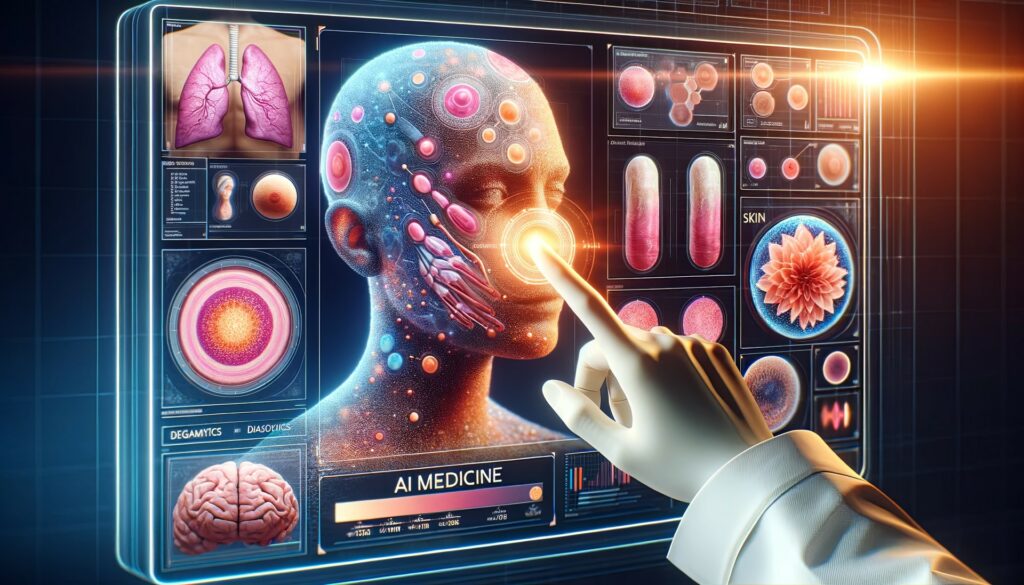Is There Room for Artificial Intelligence in Dermatology?

When it comes to the fast growth of artificial intelligence (AI) and the way it impacts all lives, it is undeniable that it has the potential to offer benefits in the medical field. Artificial intelligence is currently being used in many practice areas of medicine, including dermatology. AI is making waves worldwide, becoming a regular tool for educators, doctors, researchers, developers, and more. So, why is dermatology not an area of medicine that could or could not use AI in a valuable and helpful way? The answer is not easy.
Artificial Intelligence (AI) for Communication
In dermatology, AI may be an effective way to communicate with patients and diagnose some conditions. However, you are not alone if you are cringing at this thought. Many dermatologists and other medical professionals see the upside of AI in their field but also have some concerns.
The Upside of AI in Dermatology
According to several dermatologists, AI is an exciting time for dermatology. Compared to only five years ago, there are exponentially more options for its use, but this is conditional and very limited. When asked, most dermatologists are excited about AI’s role in administrative tasks, sending recorded messages when a professional selects, and other similar uses. However, dermatologists and other medical professionals still think there is much to learn about AI and how it benefits their field. As far as using a chatbot to dictate a note that automatically updates a patient’s record seems like a substantial saving of time. Let’s face it: most medical professionals don’t enter their field because they love paperwork. They are passionate about helping patients and finding treatments that yield results.
The Downside of AI in Dermatology
The biggest concern among dermatologists is that too much reliability in AI may cause professionals to lose sight of the purpose of their profession. As AI is continually being applied and analyzed, it is critical to know more about the quality of data provided and how the algorithms are designed for analysis. Most AI models are developed by technology professionals, not those with medical education, backgrounds, or experience. Skeptics do not think AI has the ability to accurately understand the complexities and nuances of the medical field, including dermatology.
In dermatology, specifically, many diagnoses are balanced between treatment safety, patient preference, and treatment efficacy. The practice of dermatology is heavily influenced by each individual patient, their family history, and desired results. Unlike other fields of medicine, dermatology is a collaborative and shared process between patient and licensed professional.
Good Info In: Good Info Out
When it comes to AI’s role in dermatology, it is critical that AI is fed and has the most accurate and correct information. AI is efficient at stringing bits of data together but cannot verify or assess information going in as accurate. Until this occurs, most dermatologists believe that AI’s role will continue to serve them best in administrative and patient education roles. AI may effectively collect information from a patient, help maintain consistent communication, and work as a tool for dermatologists. Still, it is far from being ready to diagnose conditions and subscribe treatments. At this time, all AI, even notes added to files, should be fact-checked before it is implemented on a broader scale, which may require more work on the front end to ensure the information it is receiving is correct.
Artificial Intelligence Has No Bedside Manner
In any field of medicine, including dermatology, those who study learn the importance of bedside manners when working with patients. Many argue that bedside manners are a crucial part of healing, and any chatbot or computer interaction can’t replicate this unique part of working with a person instead of AI. As much as patients may be excited about the prospect of having a diagnosis and treatment done without entering an office, the risk of AI misdiagnosing a patient or making mistakes based on the information it was able to get off the internet leaves too big of a gap, according to most medical professionals.
Creating An AI Code of Conduct in Dermatology
As AI continues to be used across industries, there is no doubt it will continue to be used in dermatology and other fields of medicine for administrative tasks. Regarding using AI in different capacities, the National Academy of Medicine is convening to develop an Artificial Intelligence Code of Conduct. This code of conduct is being established to ensure that the data captured and disseminated is appropriate. The code of conduct also addressed protecting the public. The main thing that will be spelled out in this code of conduct is that AI may never be used instead of a prognosis from a medical professional.
If you seek a licensed professional dermatologist in Atlanta, Dr. Sherrie Straughn has a reputation for exceptional bedside manners and longstanding relationships with her patients. Contact Buckhead Dermatology today for an appointment.
